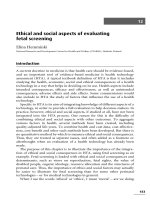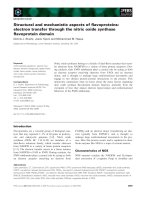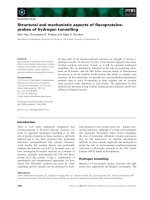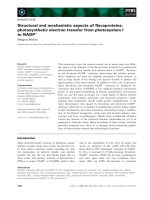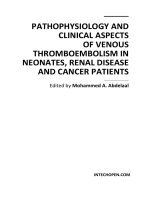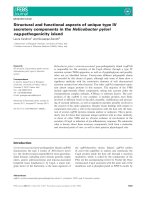Personality classic theories and modern research 6th chapter 9 humanistic existential and positive aspects of personality
Bạn đang xem bản rút gọn của tài liệu. Xem và tải ngay bản đầy đủ của tài liệu tại đây (240.59 KB, 33 trang )
Personality
Sixth edition
Chapter 9
Humanistic,
Existential, and
Positive Aspects of
Personality
Copyright © 2015, 2012, 2009 Pearson Education, Inc. All Rights Reserved
Modules (1 of 2)
Introduction: Humanistic, Existential, and Positive Aspects of
Personality
9.1: Existentialism
9.2: Humanism
9.3: Love as a Central Focus of Life
9.4: Responsibility
9.5: Anxiety and Dread
9.6: Self-Actualization Conclusion: How Is Personality
Studied and Assessed?
Copyright © 2015, 2012, 2009 Pearson Education, Inc. All Rights Reserved
Modules (2 of 2)
9.7: Happiness and Positive Psychology
9.8: Further Evaluation of Existential–Humanistic
Approaches
Conclusion: Humanistic, Existential, and Positive Aspects of
Personality
Copyright © 2015, 2012, 2009 Pearson Education, Inc. All Rights Reserved
Learning Objectives (1 of 2)
9.1: Analyze the subjective nature of existence
9.2: Examine humanism
9.3: Probe the importance given to love in Fromm's
approach
9.4: Express the role of responsibility in the
humanistic analyses of personality
9.5: Express how anxiety is triggered by a threat to
one’s core values of existence
Copyright © 2015, 2012, 2009 Pearson Education, Inc. All Rights Reserved
Learning Objectives (2 of 2)
9.6: Analyze Abraham Maslow's theory of selfactualization
9.7: Investigate the link between happiness and
positive psychology
9.8: Probe the advantages and the disadvantages
of the existential–humanistic approach to studying
personality
Copyright © 2015, 2012, 2009 Pearson Education, Inc. All Rights Reserved
Introduction: Humanistic, Existential,
and Positive Aspects of Personality
• Fromm’s approach
• Abraham Maslow’s theory
Copyright © 2015, 2012, 2009 Pearson Education, Inc. All Rights Reserved
9.1: Existentialism
Objective: Analyze the subjective nature of existence
• What is existentialism?
• Positivist view
• Existential philosophical orientation
• What existential theories try to explain
Copyright © 2015, 2012, 2009 Pearson Education, Inc. All Rights Reserved
9.1.1: The Phenomenological View
• Albert Camus
• Jean-Paul Sartre
• Phenomenological
Copyright © 2015, 2012, 2009 Pearson Education, Inc. All Rights Reserved
9.2: Humanism
Objective: Examine humanism
• Definition
• Humanistic approaches
Copyright © 2015, 2012, 2009 Pearson Education, Inc. All Rights Reserved
9.2.1: Creativity and Flow
• Self-actualized people
• Mihaly Csikszentmihalyi
Copyright © 2015, 2012, 2009 Pearson Education, Inc. All Rights Reserved
9.2.2: Relations with Other People
Define Our Humanness
• Humanist approach
• Human potential movement
Copyright © 2015, 2012, 2009 Pearson Education, Inc. All Rights Reserved
9.3: Love as a Central Focus of Life
Objective: Probe the importance given to love in Fromm's approach
• Love
• Love and personality theories
Copyright © 2015, 2012, 2009 Pearson Education, Inc. All Rights Reserved
9.3.1: Loving as an Art
• Understanding love
• Fromm’s approach
• Fromm’s concerns
Copyright © 2015, 2012, 2009 Pearson Education, Inc. All Rights Reserved
9.3.2: Dialectical Humanism
• Fromm’s beliefs
• Consistent with existentialism
Copyright © 2015, 2012, 2009 Pearson Education, Inc. All Rights Reserved
9.3.3: Evidence Supporting Fromm’s
Approach? The Age of Anxiety?
• Evidence
• Supporting trends
Copyright © 2015, 2012, 2009 Pearson Education, Inc. All Rights Reserved
9.4: Responsibility
Objective: Express the role of responsibility in the humanistic analyses of personality
• Key postulate of existential–humanistic
approaches
• Carl Rogers’ theory
• Carl Rogers
Copyright © 2015, 2012, 2009 Pearson Education, Inc. All Rights Reserved
9.4.1: Growth, Inner Control, and the
Experiencing Person
• Maturity principle
• Carl Rogers’ approach
Copyright © 2015, 2012, 2009 Pearson Education, Inc. All Rights Reserved
9.4.2: Rogerian Therapy and Becoming
One's Self
• Rogerian therapy
• Rogers’ conditions
• Result of Rogerian therapy
Copyright © 2015, 2012, 2009 Pearson Education, Inc. All Rights Reserved
9.5: Anxiety and Dread
Objective: Express how anxiety is triggered by a threat to one’s core values of existence
• Electronic onslaught
• People’s reactions
Copyright © 2015, 2012, 2009 Pearson Education, Inc. All Rights Reserved
9.5.1: Anxiety, Threat, and
Powerlessness
• Core elements of human existence
• Ways people combat alienation
• Rollo May
Copyright © 2015, 2012, 2009 Pearson Education, Inc. All Rights Reserved
9.5.2: Personal Choice
• Benefits of personal choice
• Victor Frankl
• Benefits to people facing life-threatening illnesses
Copyright © 2015, 2012, 2009 Pearson Education, Inc. All Rights Reserved
9.6: Self-Actualization
Objective: Analyze Abraham Maslow's theory of self-actualization
• Human urges
• Three aspects of human nature
Copyright © 2015, 2012, 2009 Pearson Education, Inc. All Rights Reserved
9.6.1: Early Ideas about SelfActualization in Jung’s Work
• Define self-actualization
• Jung’s approach
• Carl Jung
Copyright © 2015, 2012, 2009 Pearson Education, Inc. All Rights Reserved
9.6.2: Peak Experiences
• Describing peak experiences
• Origination
• Abraham Maslow
Copyright © 2015, 2012, 2009 Pearson Education, Inc. All Rights Reserved
9.6.3: The Internal Push for SelfActualization
• Organismic theories
• Effect of Darwin
Copyright © 2015, 2012, 2009 Pearson Education, Inc. All Rights Reserved
